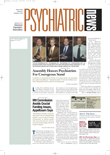What are people’s chances of reaching a ripe old age without Alzheimer’s? Probably pretty good if they have no mental disorders in their youth and younger adulthood. Probably pretty good if they don’t carry the “e4” version of apolipoprotein-E. And probably pretty good if they carry a particular version of a gene on the male sex chromosome.
So, at least, suggests a study of 100 elderly subjects and of 100 younger ones in one of the senior pockets of the United States—southwestern Pennsylvania. The study was conducted by George Zubenko, M.D., Ph.D., a professor of psychiatry at the University of Pittsburgh School of Medicine, and colleagues and is reported in the October American Journal of Geriatric Psychiatry.
During the past several decades, the American population has grown older, and nowhere in the United States are there more seniors than in Florida, followed by West Virginia and Pennsylvania, especially the southwestern corner of Pennsylvania. Thus, Zubenko and his colleagues were in a prime position to tap many seniors for their study.
They advertised for seniors willing to take part in their study at primary care practices, assisted-living facilities, religious groups, community groups, and some other sources. Eventually they recruited 100 seniors—50 women and 50 men—who had reached the age of 90 years or more with a sound mind. They also recruited 100 adults who were between the ages of 18 and 25 years and matched these senior subjects on gender, race, and ethnicity.
Zubenko and his coworkers then obtained information about the mental and physical health of their subjects, as well as about personal habits that might have impacted their health and longevity. Blood samples for DNA analysis were drawn. In addition, the researchers collected DNA samples from 100 persons who had died and had been confirmed through autopsy to have had Alzheimer’s disease.
Zubenko and his colleagues first compared the information they had collected about their older and younger subjects in hopes of identifying some characteristics typical of the former, but not of the latter, that might help explain how the older subjects had managed to reach 90 years with a sound mind. The researchers found one characteristic that seemed to fill the bill: not having mental disorders in one’s younger years.
Specifically, the seniors in their study had experienced only half the lifetime prevalence of mental disorders that the young subjects in their study had, even though the younger subjects had not lived through the age of risk for developing most mental disorders. All of the mental disorders experienced by the elders developed in late life, that is, after 81 years of age. Other studies showed that having mental disorders early in life can thwart longevity. Thus, not having had mental disorders in their earlier years may have helped these seniors reach old age cognitively intact, Zubenko and his coworkers reasoned.
Second, Zubenko and his team used the DNA samples that they had collected from their senior subjects and from their junior subjects, as well as from the 100 persons who had had Alzheimer’s disease before dying to determine how common the e4 version of apolipoprotein-E was in each of the three groups. They were interested in the e4 version since it has been linked with susceptibility to late-onset Alzheimer’s (Psychiatric News, October 4). They found that 42 percent of the deceased persons with Alzheimer’s and 12 percent of the young adults had the e4 version, compared with only 7 percent of the seniors. Thus, not having this e4 version probably also helped their seniors make it to age 90 with a sound mind, Zubenko and his colleagues think.
Finally, Zubenko and his coworkers compared Y chromosomal material from their male senior subjects to Y chromosomal material from their male younger subjects in hopes of identifying one or more differences. And indeed, they found a particular region on the Y chromosome that differed significantly between the two groups of subjects. Thus, they suspect that a particular version of a gene in this region of the Y chromosome might have helped their male seniors make it to age 90 with a sound mind.
The study was funded by the National Institute of Mental Health.
Am J Geriatr Psychiatry 2002 10 619
